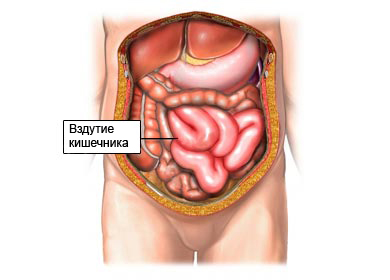Bowel obstruction – Ogilvie's syndrome
Description ileus
Ogilvie's syndrome is a type of bowel obstruction. This results in cessation of peristalsis. Peristalsis – wavelike contractions, which help the contents of the colon and small intestine to move through the intestines.
This type of bowel obstruction is “nonmechanical” intestinal obstruction. Another type is called “mechanical” obstruction. Mechanical obstruction occurs when a physical blockage of the intestine.

Causes of bowel obstruction
Bowel obstruction can cause:
- Abdominal surgery;
- Spine surgery;
- Injury or trauma;
- Infection, such as:
- Abdominal infections: peritonitis, appendicitis, diverticulitis;
- Pneumonia;
- Severe generalized infections (sepsis);
- Heart attack;
- Electrolyte Imbalance;
- Disorders of muscle function;
- The use of certain drugs, such as narcotic medications for pain relief medication or for lowering high blood pressure;
- Poor blood supply to some parts of the gut (mesenteric ischemia).
Risk factors for ileus
Risk factors for ileus include:
- Bryushnaya surgery, infection, or injury;
- Spine surgery;
- Bowel obstruction, the former earlier;
- The use of certain painkillers or drugs for lowering high blood pressure;
- Some diseases, such as:
- Pneumonia;
- Heart attack.
Symptoms of bowel obstruction
Symptoms of bowel obstruction may include:
- Abdominal distention;
- Pain;
- Vomiting;
- Gripes;
- Ikotech;
- Failure of a chair or gas.
Diagnosis of ileus
Ileus diagnosed, usually, based on the symptoms and tests. Tests may include:
- X-ray examination;
- CT scan;
- Barium enema – analysis, for which the bowel is filled with a solution of a barium salt, and do an X-ray of the colon;
- Colonoscopy – a thin tube inserted through the rectum into the colon, to explore its cover.
Treatment of intestinal obstruction
If ileus was caused by surgery, it usually extends over 48 – 72 hours. In other cases, disease, which caused a bowel obstruction, should be treated.
Also, to help ease the symptoms of bowel obstruction may be performed the following procedures:
Diet
Patients, suffering from ileus, You should not eat, while the obstruction passes.
Nasogastric suction (NG tube)
The tube is inserted through the nose into the stomach, to remove digestive fluids. This will help relieve the pain and prevent bloating.
Intravenous fluids and electrolytes
Fluids injected into a vein, to avoid dehydration. Electrolytes are introduced, to help cure bowel obstruction.
Medication
There are medicines, that increase peristalsis (Proserinum, Tegaserod), and that you can use, to assist in decision ileus.
Decompression via colonoscopy
The flexible tube may be inserted into the colon, to reduce the pressure in the intestine.
Surgery
Rarely, solutions to problems you want to delete part of the intestine.
Prevention of bowel obstruction
Since ileus, usually, the result of trauma, surgery, or disease, methods of its prevention does not exist.
